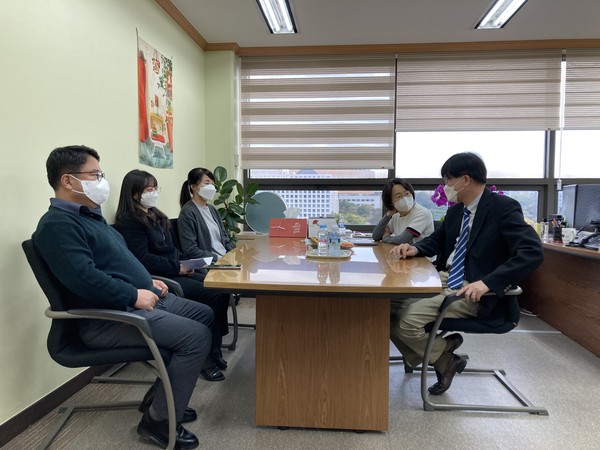Despite social distancing and personal hygiene measures, COVID-19 does not show any signs of disappearing soon. We have witnessed how even one infected person could bring about a large-scale outbreak if safety protocols are not observed properly. KAIST is protected by the COVID-19 Task Force, a special team in charge of enacting on-campus safety guidelines, responding to reports and inquiries from the KAIST community, and controlling outsider access, among other responsibilities. The KAIST Herald interviewed the Task Force to find out more about their work and their decision-making processes.

What does a typical day in your job look like?
A typical weekday [mostly consists] of answering inquiries via email and phone as well as doing our tasks besides the COVID-19 tasks. As the safety and health of all KAIST members are our priority, we have the responsibility to guide our members depending on the level of social distancing and answer various inquiries. For example, a caller could inquire about what protocol [they] should follow if they have shared a similar travel history with a confirmed COVID-19 patient.
How do you make decisions (coming up with prevention measures and guidelines, cooperating with other offices, etc)?
Generally, we follow and take into account the government’s guidelines related to the level of social distancing, and apply them to our own policy. However, as we have many multi-use facilities such as dormitories, our school’s guidelines are stricter than the government’s.
Up to this point, there have been no recorded COVID-19 cases at KAIST. How do you manage to prevent outbreaks on campus?
Thankfully, we currently do not have any COVID-19 cases on campus. We believe it is because every KAIST member is actively cooperating with our school’s guidelines and following the personal hygiene protocol. We greatly appreciate everyone for their cooperation and having the mindset of caring for others.
Is it challenging to prevent COVID-19 transmission on campus? Why or why not?
It is challenging to prevent COVID-19 transmission on campus as [our] school [has many] multi-use facilities and COVID-19 has a high transmission rate. Therefore, we need everyone’s cooperation in wearing masks, following personal hygiene protocols, etc.
Since a lot of international students are still stuck in their home countries, are there many issues with international students? If so, what are some of the most common problems and how do you deal with them?
[Some] common problems are online classes and coming back to campus after receiving the authorization to do so. Some students have trouble with [their] internet connection; we try to accommodate the students and they receive the authorization to come back to KAIST. However, even then, some have trouble coming to KAIST due to the [often] limited number of flights.
What would be your actions if there was a confirmed case at KAIST?
If there was a confirmed case, we will let the KAIST community know of this situation and see if any KAIST members have the same travel history with the confirmed patient. Those who share the same travel history or [live in] the same dormitory will be guided to self-isolate and to contact the City Health Center. We will also shut down and disinfect the locations where the confirmed patient has visited and all multi-use facilities. After [that], we will disinfect the whole campus.
Recently, Korea entered its third wave of COVID-19. How do you think this would affect KAIST in the near future, and what measures are you preparing?
As we entered the third wave of COVID-19, the level of social distancing was increased with metropolitan cities in level 2 and Daejeon in level 1.5. If there is a continuous increase of confirmed cases and the levels are elevated, our school would apply a rigorous [social distancing] policy. For example, the sports facilities that have been in trial operation may close again.
Related to the previous question, are there any differences with how you dealt with previous major case spikes (i.e. during the Shincheonji outbreak in late February and the Itaewon outbreak in early summer)?
As those outbreaks were in specific locations, we [sent out] a survey for KAIST members [asking those who] have visited any of those locations to self-isolate or self-monitor. The current wave of COVID-19 is not surrounding a specific group or location [but] is widely spread. Therefore, rather than having a survey, we are [having people report if they have] cold symptoms or shared a travel history with a confirmed patient.
As the current semester is ending, do you have any plans on how to handle the next semester? What factors can affect whether the next semester is online or offline, and when can we expect a decision?
The COVID-19 situation is literally a “moving target”. It is thus very challenging to make a long-term plan or prediction, but it is unlikely that we go back [to an entirely offline semester] early next year. Nevertheless, January 2021 will be different from January 2020. We believe we can make more fine-tuned policies as we learn more and more about this pandemic. To provide students with a sufficient amount of time for preparation, we will try to announce the detailed policy for the 2021 Spring semester as early as possible. The COVID-19 situation in Korea and around the world, development of vaccines and medicine as well as their global availability, and national policies will be the key factors to consider when making decisions.
Do you have any message to readers of The KAIST Herald?
Please follow the safety protocol of wearing masks, following personal hygiene, and social distancing and stay [safe]! "Coherent collaboration among all of us" is the key to overcoming this pandemic. Let's be grateful to one another, including yourself, [and] at KAIST for holding up so well in this challenging time. Thank you all and let's continue to do well in the future.

